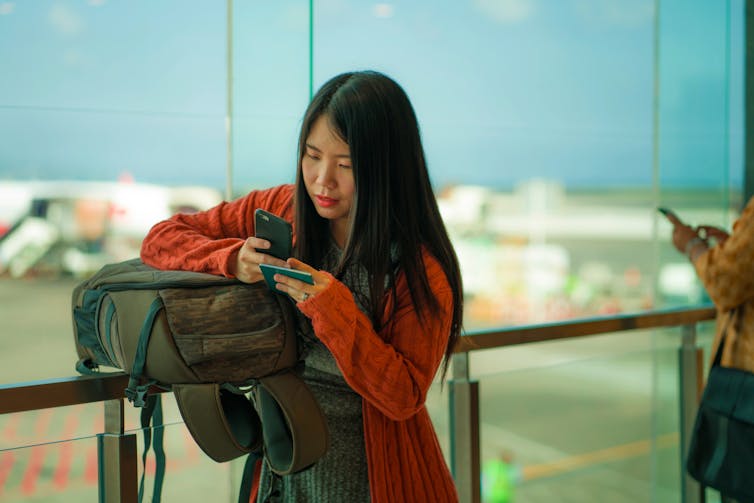stranded students feel shame and pressure to give up study
- Written by Angela Lehmann, Honorary Lecturer, College of Arts and Social Sciences, Australian National University
A petition from more than 17,000 international students asking for exemptions to the border closure was presented to the Australian parliament last week. The latest available figures show about 20% of Australia’s enrolled international students were stranded offshore. Of the 92,191 in this position, 70% were Chinese.
We worked with Chinese international students to collect 28 written accounts of what their life has been like over the past year. Those that responded were male and female at varying stages of their studies.
The stories we collected in our ongoing research paint a picture of anxiety, embarrassment and shame. Many feel the burden of placing financial pressure on their parents. Some female students are under pressure to give up their study plans and focus on traditional gendered expectations to earn money and get married before their late 20s.
 The students are desperately waiting for the time when they can pack their bags and return to study in Australia.
Shutterstock
The students are desperately waiting for the time when they can pack their bags and return to study in Australia.
Shutterstock
Feeling shame and embarrassment
Shen is a first-year student from rural China. It had been her dream to study abroad since she first heard about the possibility from a distant relative.
When the borders closed, she struggled to convince her parents to pay the fees. With COVID-19 cases easing in China, she reassured them it was only a matter of time before the borders were open. Twelve months later, Shen is feeling embarrassment and shame. She says:
Finally, they relented and agreed to pay the tuition on the condition that, as a backup plan, I would also prepare for the gaokao [China’s college entrance exam]. I accepted their terms and at the end of April my father sent the tuition fee of 150,000 yuan; half of their savings from the last decade. The rest of my fees would be paid through the selling of the family convenience store and any extra money I made at my part-time job.
Shen passed her exam and now faces pressure to study at home. Part of her decision to study abroad was to explore alternative visions of her future. Her dream was about “a chance to experience a new way of learning and a new way of life”.
Many students wrote about the shame they felt being stuck in China. Some recounted neighbours and their local community questioning and making fun of their ambition to study abroad during the pandemic.
One student wrote about how she desperately hoped she could leave before the Chinese New Year celebrations:
A barrage of criticism from disapproving relatives surely awaits me over Chinese New Year. More importantly, this time reserved for family reunion raises the question, where is home for an outsider that never quite fits?
Tensions within families and communities
The students’ accounts tell of increasing family tensions about finances and delayed career paths in particular.
Jing had always dreamt of studying clinical medicine abroad and was due to start in Australia in 2020. Her parents were not sold on the idea to begin with and now she faces pressure to study in China instead. She recounts what they tell her:
Your classmates are already in their third year of university; you have no work experience and only a high school diploma. Who could possibly want you? We have already waited a year for Australia. What if it is another three years, what if it’s five, will you still wait then? You’re running down a dead end. Are you going to just keep going until you hit a wall? Will your dreams pay your bills?
They say: “Darling, it’s all our fault. We should never have let you go in the first place.”
Jing says she feels she is drifting apart from her parents.
Fighting to hold onto their dream
A recent University of Melbourne study followed 50 female Chinese students over five years. It found studying abroad allowed them to delay marriage by a few years while they built a sense of individualism and identity. Studying abroad was seen as “time out” from a standard feminine life script hinging on marriage and family and allowed young women to experience alternative futures.
 Students dream of studying overseas as a way to open up the possibilities in their lives.
Shutterstock
Students dream of studying overseas as a way to open up the possibilities in their lives.
Shutterstock
The written accounts we analysed describe the pandemic and border closures as putting a stop to this experience. Some now face pressure to give up plans to study abroad and instead conform to expectations to enter the workforce and marriage.
Mei is a medical student who says her “life has come to a standstill”. She writes:
I live in a city in the middle of nowhere, a place where people don’t see the value of education, especially for girls. There is a common adage here: rather than studying well a girl is better off marrying well. Even my parents urge me to give up on studying abroad and instead find a stable job and get married […]
Both my parents come from humble backgrounds and supporting my aspiration to study abroad has been just one more pressure in their lives […] Nowadays, even spending a few dollars on milk tea makes me anxious that I am only affirming their belief that I am freeloading off my parents.
Many of these young women are determined to wait for borders to reopen and fulfil their ambition. One wrote:
Pandemic or not, I will stick to my plan.
These students need support
These stories demonstrate the intimate ways Australia’s higher education sector is linked with the everyday lives of young people globally. During the pandemic, being “stuck at home” has affected not only students, but also their families and their relationships with their communities.
These stories highlight the diverse experiences of international students while Australia’s borders are closed and offer a different take on the importance and role of international education.
Connecting these students to Australian counterparts to help with social relationships – albeit digitally for now – could go some way to ensuring these young people, and their families, are supported and reassured.
Their stories also suggest government messaging about Australia’s border closures should be aimed at families – not individuals. And it should be targeted, empathetic and, for this particular cohort, in Mandarin.
Authors: Angela Lehmann, Honorary Lecturer, College of Arts and Social Sciences, Australian National University





